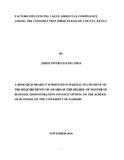| dc.contributor.author | King’oina, Jared O | |
| dc.date.accessioned | 2017-01-04T13:27:54Z | |
| dc.date.available | 2017-01-04T13:27:54Z | |
| dc.date.issued | 2016 | |
| dc.identifier.uri | http://hdl.handle.net/11295/98921 | |
| dc.description.abstract | Tax is an important stream of revenue for the government’s development projects and therefore
all efforts must be made by governments to ensure that it is accurately and efficiently collected.
The main issue faced by all tax authorities is that it has never been easy to persuade all
taxpayers to comply with the regulations of a tax system. Tax compliance is the degree to
which the taxpaying community meets the tax obligations set out in the appropriate legal and
regulatory provisions, (Maxwell, 2003).
The construction industry contributes approximately 4.2% to the Gross Domestic Product. The
main objective of the study is to establish factors influencing Value Added Tax compliance
among the construction firms in Kisumu County. The researcher employed a descriptive design
to collect a large quantity of information about the population being studied. Descriptive
approach was integrated with survey design in collecting comprehensive qualitative and
quantitative data that enriched the outcome of the study. The study targeted all registered
construction firms within Kisumu County. The researcher collected primary data from the
sampled construction firms using self administered questionnaires. Data collected was
analyzed using Statistical Package for Social Sciences and the study findings presented in the
form of tables.
All the established factors have a significant influence on the Value Added Tax compliance
among the construction firms. The findings revealed that tax understanding and knowledge has
a significant effect on tax compliance. Better understanding of VAT laws encourages voluntary
compliance. Reduced tax compliance cost is associated with high levels of tax compliance. The
study findings reveal that effective imposition of fines and penalties play a vital role in
improving tax compliance. The findings of the study show that taxpayer perception and
attitudes has a significant effect on tax compliance. It is therefore prudent for KRA to enhance
their taxpayer education activities to enable businesses have better understanding of various
factors affecting tax compliance. These study findings will help KRA and the government
develop interventions that will encourage voluntary tax compliance that will lead to increased
revenue collection to enable the government provide goods and services to its citizens. | en_US |
| dc.language.iso | en | en_US |
| dc.publisher | University Of Nairobi | en_US |
| dc.rights | Attribution-NonCommercial-NoDerivs 3.0 United States | * |
| dc.rights.uri | http://creativecommons.org/licenses/by-nc-nd/3.0/us/ | * |
| dc.title | Factors Influencing Value Added Tax Compliance Among the Construction Firms in Kisumu County, Kenya | en_US |
| dc.type | Thesis | en_US |



